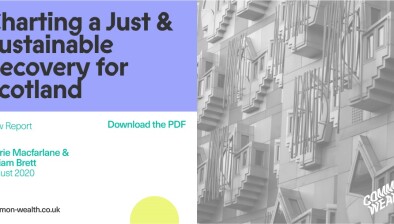Councils empowered to introduce short-term lets control areas
Local authorities are to be given new powers to regulate short-term lets where they decide this is in the interests of local communities, under measures to be introduced by the Scottish Government.

Housing minister Kevin Stewart announced in the Scottish Parliament today that councils will be given the ability to implement a licensing scheme which will include a new mandatory safety requirement that will cover every type of short-term let.
Airbnb UK told Scottish Housing News it has long supported calls for fair regulations and it wants to work with the Scottish Government on clear and simple guidance for hosts.
Set to be introduced from spring 2021, Mr Stewart said the licensing scheme will enable councils to know and understand what is happening in their area, improve safety and assist with the effective handling of complaints.
It will also give councils the discretion to apply further conditions to address the concerns of local residents. Councils will be able to designate control areas to ensure that planning permission will always be required for the change of use of whole properties for short-term lets.
Responding to a question from Graham Simpson MSP, Mr Stewart said he expects the licensing scheme to be run by councils on a cost-neutral basis and he is prepared to work with councils to decide on any appeal process.
Additionally, ministers have committed to carefully and urgently consider how short-term lets will be taxed in the future to ensure they make an appropriate contribution to local communities and support local services. The approach taken to short-term lets will complement the Transient Visitor Levy Bill, which will be introduced later this Parliament.
Kevin Stewart said: “Short-term lets can offer people a flexible travel option and have contributed positively to Scotland’s tourism industry and local economies across the country.
“However, we know that in certain areas, particularly tourist hot spots, high numbers of short-term lets are causing problems and often make it harder for people to find homes to live in.
“That is why we are empowering local authorities to implement a system that works for their area. By giving councils the power to set conditions around short-term lets licences and put in place planning control areas to tackle hot spots, communities across Scotland will be able to decide what is best for them and their local economy.
“Everybody wants visitors, hosts, neighbours and local residents to be safe. That is why the licensing scheme includes a safety element which will be mandatory across Scotland for all short-term lets. Separately, local authorities will be given discretion to include further conditions to help tackle littering or overcrowding of properties.
“These powers will allow local authorities to ensure a safe, quality experience for visitors, whilst protecting the interests of local communities.”
A consultation on a regulatory framework for short-term lets in Scotland received over 1,000 responses, the majority of which were supportive of some form of regulation. The responses were published in October 2019, together with an independent analysis of the responses and independent research on the impact of short-term lets on communities and housing across Scotland.
The City of Edinburgh Council leader Adam McVey welcomed the news that the council’s call for new legislation has been successful.
He said: “Today’s announcement by the Minister is extremely welcome news and will give us the controls that we need over short term lets for our residents and communities across Edinburgh. It meets our request for mandatory licences and we will now be in a position to more effectively implement planning controls to stop this increase. A review of taxation in this area will also make sure that businesses are paying properly for income they’re receiving and local services they’re using.
“In 2018, we set up a working group to look at this in detail and provide recommendations, the main one being the need for a regulatory system. Since then we’ve been working closely with the Scottish Government on the implementation of a new regulatory system, so I’m delighted that we’ll now be able to take this forward, and soon.
“This news also comes on the back of our successful campaign to introduce a tourist tax which will also make sure that visitors to the city are financially contributing to the services that they use. All of which, are part of a package of measures to better manage the enormous success of our tourist economy.
“We’ll now work with the Scottish Government on the details of the new system which I hope will allow us to react quickly when rules are breached as well as addressing the particular challenges we face in Edinburgh such as housing being taken out of supply, rising rents and anti-social behaviour.
“Next week we will also set out how we propose to tackle this issue through the introduction of new planning policies in our consultation document ‘Choices’ for the next local development plan City Plan 2030.”
Responding to the statement, Scottish Greens local government spokesperson Andy Wightman MSP said: “I am pleased that the Minister has finally acted on my long term campaign and informed parliament of his plans to regulate short term lets. Those communities who have been adversely impacted by short term lets will be pleased that the government has now committed to introducing a much-needed, long overdue licensing scheme by 2021.
“It’s clear that no licenses should be issued unless proper planning consent is in place, and I am disappointed that the Scottish Government don’t seem to share that view.”
Graeme Brown, director of Shelter Scotland, said: “Airbnb-style short-term lets are an important part of making Scotland an attractive place to visit. However, the unregulated growth has led to too many people being locked out of homes that could be let privately to help tackle Scotland’s housing emergency.
“Today’s announcement is a welcome first step. Licencing, taxation and limits are the right and proportionate response. The test will be if communities in places like Edinburgh and Skye see real change and real opportunities to find the homes they need.”
Mr Brown added: “Scotland has an acute housing emergency and, while these powers on their own won’t solve that emergency, they will help protect communities and ensure that local housing needs are better met.
“Only by building enough social homes to meet demand - now and in the future - can Scotland fulfil its responsibility of providing the human right of a home for everyone.”
Megan Bishop from Living Rent said: “Today’s announcement on short-term holiday lets represents a huge step forward for tenants in Scotland. For far too long, these types of short-term lets have been allowed to wreak havoc in our communities, displacing families and driving up rents.
“Living Rent has long been demanding exactly the kind of measures the Scottish Government have announced today, and this is a huge victory for our union.
“The devil will be in the detail, but we will continue to fight hard to demand these powers have teeth and are used to their full potential. The priority has to be safe, affordable homes for residents - not the astronomic profits of holiday let landlords.”
A spokesperson for Airbnb UK told Scottish Housing News: “We have long supported calls for fair regulations and a tourism tax in Scotland. Now we want to work with the Scottish Government and local authorities on clear and simple guidance for hosts.
“Together we can help locals share their homes and follow the rules, and avoid a system that excludes working families through fees, barriers and bureaucracy. Our platform is an economic lifeline for countless local families and travel on Airbnb boosts the Scottish economy by almost £2 million a day.”
John Blackwood, chief executive of the Scottish Association of Landlords (SAL), said: “For some time, SAL have been calling for proportionate, effective regulation of short-term lets to ensure that tenants have high-quality and safe accommodation so we welcome this move which will help local authorities understand what is happening in their area.
“We look forward to seeing the full proposals regarding the proposed licensing system when they are presented to the Scottish Parliament and to working with government, councils, tenants and others to help landlords deliver the broad mix of accommodation that Scotland needs.”







